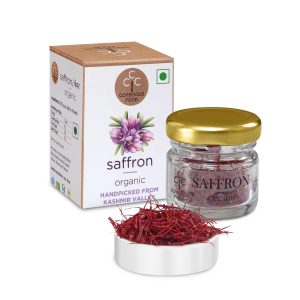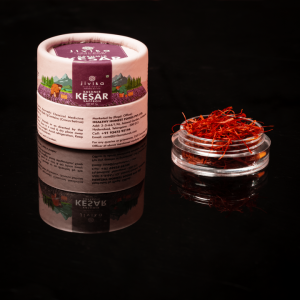Saffron benefits extend far beyond its reputation as a prized culinary spice; its medicinal properties have been revered for centuries. The vibrant crimson threads of saffron offer a wealth of health advantages, backed by both traditional wisdom and modern scientific research. Rich in antioxidants like crocin and safranal, saffron exhibits potent anti-inflammatory properties, making it a valuable ally in combating various ailments. From alleviating symptoms of depression and anxiety to enhancing cognitive function and promoting eye health, saffron stands as a versatile and potent natural remedy. As interest in holistic wellness grows, exploring the multifaceted benefits of saffron promises to unlock new avenues for enhancing overall health and vitality.
Top 7 Saffron Benefits: You Should Know
The Benefits of Saffron are as diverse as they are profound, transcending its status as a mere culinary delight. This ancient spice, prized for its vibrant color and distinct flavor, holds a revered place not only in kitchens but also in traditional medicine practices worldwide. Its medicinal properties have been studied for centuries, with modern science increasingly uncovering its remarkable therapeutic potential. From its ability to reduce inflammation and improve mood to its role in enhancing cognitive function and supporting eye health, saffron emerges as a powerful natural remedy. As interest in holistic wellness continues to grow, the benefits of saffron stand out as a beacon of ancient wisdom validated by contemporary research. Delving into the myriad ways saffron can enrich both culinary creations and overall well-being promises a journey filled with discovery and rejuvenation.
1. Supports a Healthy Pregnancy
Saffron’s reputation for enhancing pregnancy health is well-established. Packed with nutrients essential for expectant mothers, it aids in alleviating morning sickness and ensuring maternal wellness. Additionally, the benefits of saffron extend beyond pregnancy, offering a range of health advantages backed by its impressive nutritional profile. However, it’s important to be mindful of potential saffron side effects and use it in moderation to maximize its benefits without adverse effects.
Also Read:- Mustard Oil Benefits
2. Enhances Mood and Treats Depression
Saffron’s mood-enhancing benefits are among its most remarkable attributes. Research has highlighted saffron’s ability to address symptoms of depression and anxiety by boosting serotonin levels in the brain. This underscores the significance of saffron nutrition in promoting mental well-being. However, it’s essential to be aware of potential saffron side effects and use it judiciously to harness its benefits safely.
-
 Kanz & Muhul Season’s Harvest Saffron – Mongra₹450 – ₹3500 Shop Now
Kanz & Muhul Season’s Harvest Saffron – Mongra₹450 – ₹3500 Shop Now -
 Dvaar Saffron Sandal Facial Bar – 100 g₹35325% OFF Shop Now
Dvaar Saffron Sandal Facial Bar – 100 g₹35325% OFF Shop Now
Also Read:- Best Foods for Bone Health
3. Boosts Immunity
Embracing saffron benefits through regular consumption can bolster the immune system, owing to its rich antioxidant content. Saffron nutrition, abundant in antioxidants, plays a crucial role in neutralizing free radicals and fortifying the body against a spectrum of diseases. However, it’s imperative to be mindful of potential saffron side effects and moderate its intake to maximize its benefits without adverse consequences.
Also Read:- Vitamin D Rich Foods
4. Improves Digestion
The benefits of saffron extend to digestion, where it plays a vital role in promoting gastrointestinal health. Through its ability to stimulate the production of digestive enzymes, saffron nutrition facilitates efficient digestion. Moreover, its anti-inflammatory properties offer relief to the digestive tract, easing symptoms of indigestion. However, it’s crucial to be aware of potential saffron side effects and consume it in moderation to reap its digestive benefits safely.
Also Read:- Best Masala Tea Brands in India
5. Promotes Radiant Skin
Saffron benefits extend to skincare, where its antioxidant properties play a pivotal role in nurturing radiant skin. Its ability to counteract free radical damage and diminish inflammation contributes to a healthier complexion, highlighting the importance of saffron nutrition in skincare routines. However, it’s essential to be mindful of potential saffron side effects and incorporate it into skincare regimens cautiously to harness its benefits effectively.
Also Read:- Mint Tea Brands in India
6. Regulates Blood Pressure
The benefits of saffron encompass its potential to regulate blood pressure, particularly advantageous for individuals managing hypertension. Through its compounds, saffron nutrition aids in stabilizing blood pressure levels, thereby promoting cardiovascular well-being. However, it’s essential to be aware of potential saffron side effects and consume it judiciously to optimize its cardiovascular benefits safely.
-
 Conscious Food Saffron 1g₹450 Shop Now
Conscious Food Saffron 1g₹450 Shop Now -
 Aditam Real Organic Kashmiri Saffron₹49923% OFF Shop Now
Aditam Real Organic Kashmiri Saffron₹49923% OFF Shop Now
7. Protects Eye Health
Saffron’s nutritional richness, highlighted by its carotenoid content including crocin and crocetin, offers significant benefits for eye health. Studies indicate that these compounds contribute to safeguarding against age-related macular degeneration, underscoring the importance of saffron in maintaining optimal vision. However, it’s crucial to be mindful of potential saffron side effects and use it appropriately to harness its eye-protective benefits safely.
Also Read:- Matcha Tea Brands in India
Saffron Nutrition
Saffron nutrition is a topic of growing interest among health enthusiasts, as this prized spice offers a wealth of essential nutrients and bioactive compounds. Renowned for its vibrant color and distinctive flavor, saffron goes beyond mere culinary delight to provide a range of health benefits rooted in its nutritional profile. Rich in carotenoids such as crocin and crocetin, saffron boasts potent antioxidant properties that support overall well-being. Additionally, saffron is a source of vitamins and minerals like vitamin C, vitamin A, and potassium, further enhancing its nutritional value. As research continues to unveil the potential health benefits of saffron nutrition, it emerges as a valuable addition to a balanced diet, promising not only flavor but also a myriad of health-promoting compounds.
Saffron is not only prized for its health benefits but also for its nutritional value. Here’s a nutritional breakdown of saffron per 100g:
| Nutrient | Nutrition Value |
|---|---|
| Calories | 310 kcal |
| Carbohydrates | 65.37 g |
| Protein | 11.43 g |
| Fat | 5.85 g |
| Fiber | 3.9 g |
| Vitamin A | 530 IU |
| Vitamin C | 80.8 mg |
| Iron | 11.1 mg |
| Potassium | 1724 mg |
Saffron Side Effects
Saffron, celebrated for its myriad health benefits and culinary versatility, also warrants attention for its potential side effects. While this golden spice offers a treasure trove of medicinal properties and nutritional value, it’s essential to be mindful of the possible adverse reactions it may cause in certain individuals. Saffron side effects can range from mild symptoms like dizziness and nausea to more severe reactions such as allergic reactions in susceptible individuals. Additionally, excessive consumption of saffron may lead to toxicity, posing risks to health. Understanding saffron side effects is crucial for harnessing its benefits safely and effectively. As with any potent ingredient, moderation and awareness are key to enjoying the advantages of saffron while minimizing potential risks.
While saffron offers numerous health benefits, it’s essential to be aware of potential side effects:
While the benefits of saffron are numerous, it’s important to be cautious of potential saffron side effects, particularly when consumed in large amounts. Excessive intake of saffron may lead to symptoms such as nausea, vomiting, and dizziness in certain individuals. These adverse reactions underscore the significance of moderation when incorporating saffron into one’s diet or supplementation regimen.
1. Allergic Reactions
While exploring the benefits of saffron, it’s crucial to remain aware of potential saffron side effects, particularly allergic reactions. Some individuals may experience symptoms such as itching, swelling, or difficulty breathing when exposed to saffron. This highlights the importance of considering saffron nutrition carefully, especially for those with known allergies to spices or plants in the same botanical family as saffron. Taking necessary precautions can help individuals enjoy the benefits of saffron safely and minimize the risk of adverse reactions.
Also Read:- Lemongrass Tea Brands in India
2. Impact on Certain Medical Conditions
Considering both the benefits of saffron and its potential side effects is crucial, especially for individuals with specific medical conditions. For instance, those diagnosed with bipolar disorder should exercise caution with saffron consumption, as it has the potential to precipitate manic episodes. Furthermore, saffron may interact unfavorably with certain medications, including blood thinners and antidepressants, possibly leading to adverse effects or diminished drug efficacy. Understanding these potential risks associated with saffron is essential for informed decision-making regarding its use, ensuring individuals can maximize its benefits while minimizing potential adverse outcomes.
Conclusion
In conclusion, the diverse array of saffron benefits underscores its remarkable value as both a culinary ingredient and a medicinal herb. From its role in promoting mood stability and enhancing cognitive function to its potential to support cardiovascular health and bolster the immune system, saffron stands out as a versatile and potent natural remedy. However, it’s essential to approach saffron consumption with caution, considering potential saffron side effects and interactions, particularly for individuals with specific medical conditions or allergies. By embracing saffron’s nutritional richness and harnessing its therapeutic potential responsibly, individuals can unlock a world of holistic wellness rooted in ancient tradition and supported by modern scientific research.













